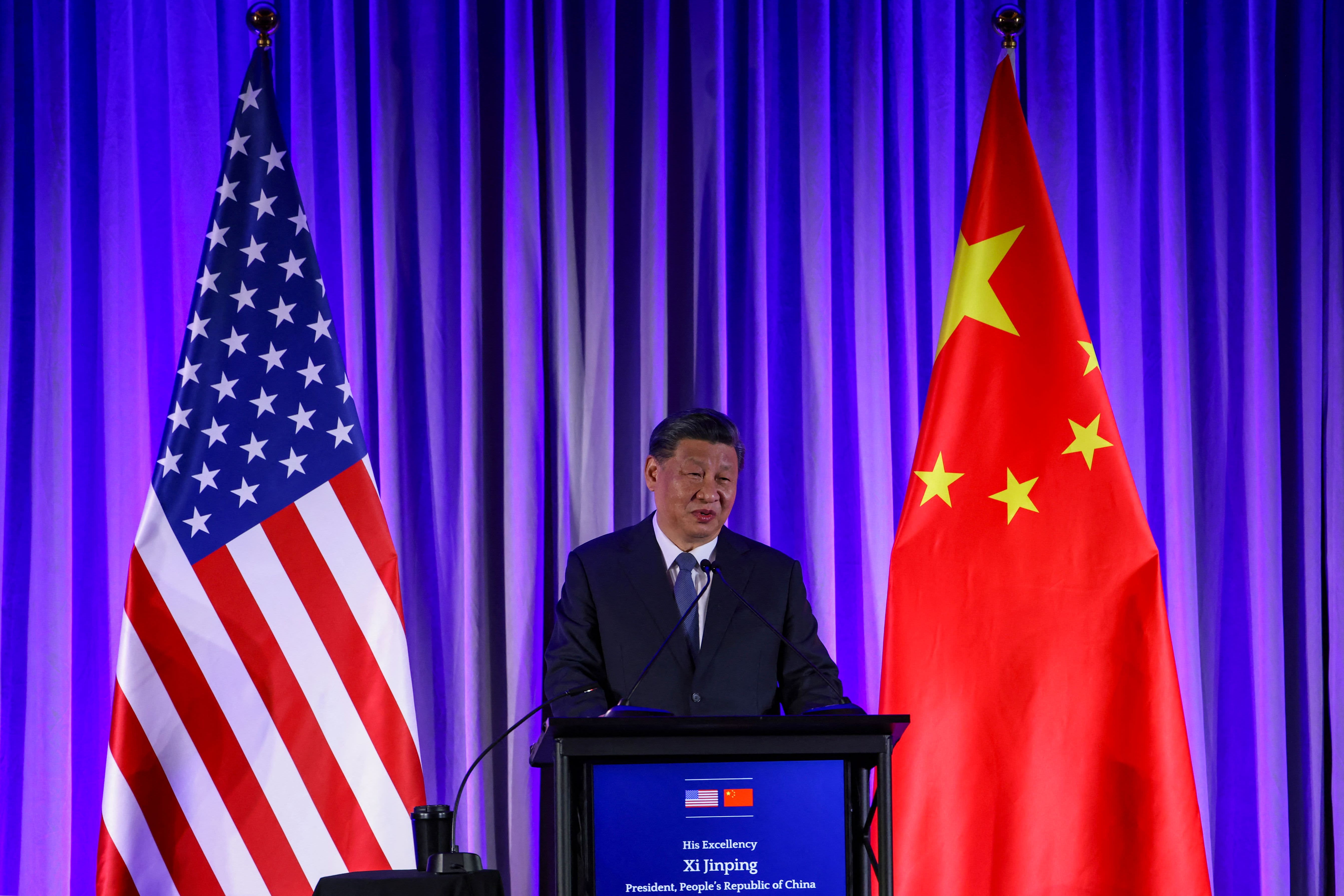
BEIJING — Chinese President Xi Jinping told U.S. executives on Wednesday that bilateral relations can improve, and pledged that Beijing would keep working to improve the business environment.
“Over the past couple of years, the China-U.S. relationship experienced some setbacks and serious challenges, from which lessons should be learned,” an official English-language readout of Xi’s remarks said. “The relationship cannot go back to the old days, but it can embrace a brighter future.”
“China and the United States should help rather than hinder each other’s development, both in traditional areas such as trade and agriculture, and in emerging areas such as climate change and artificial intelligence,” the readout said.
Blackstone Chairman and CEO Stephen Schwarzman, Qualcomm President and CEO Cristiano Amon, National Committee on U.S.-China Relations Board of Directors Chair Evan G. Greenberg, Harvard’s John F. Kennedy School of Government Founding Dean Graham Allison and President of the U.S.-China Business Council Craig Allen were among the attendees, according to the readout.
The U.S.-China Business Council said in a press release that it “was honored to be invited to and participate in the dialogue with President Xi to discuss our concerns over the decline in trade, investment, and business confidence, as well as our desire to help improve engagement and commercial exchange between our two countries.”
The council said it emphasized the need for China to increase the role of consumption in the economy.
China set a target of around 5% growth this year. Authorities have made boosting industrial development a priority, while pushing forward with efforts to support consumption.
In the Chinese side’s readout, Xi described China’s economy as “sound and sustainable,” and pushed back on some forecasts that the country would soon “peak.”
China’s foreign minister and top diplomat Wang Yi, National Development and Reform Commission Chair Zheng Shanjie and Minister of Commerce Wang Wentao also attended the meeting, according to state media footage.
FedEx confirmed its president, Rajesh Subramaniam, was among those who met with Xi on Wednesday. Blackstone and Qualcomm did not respond to CNBC requests for comment. The National Committee on U.S.-China Relations did not provide a statement.
“I commend [Xi’s] personal engagement in the U.S.-China relationship, including a meeting like this. Engagement is how relationships are built and knowledge is shared,” the committee’s chair Greenberg said in remarks broadcast by Chinese state television. Greenberg is also chairman and CEO of insurance company Chubb.
Working on foreign business conditions
The U.S.-China Business Council release also said that during the meeting with Xi, it “encouraged” China to “further address longstanding concerns with cross-border data flows, government procurement, better protection of intellectual property rights, and improved regulatory transparency and predictability.”
Last Friday, the Cyberspace Administration of China formally eased once-stringent data export requirements with the release of long-awaited new rules.
“China’s reform will not pause, and its opening up will not stop,” the official readout of Xi’s remarks said. “China is planning and implementing a series of major steps for comprehensively deepening reform, and steadily fostering a market-oriented, law-based and world-class business environment. This will create broader development space for U.S. and other foreign businesses.”
Xi previously addressed a similar group of U.S. business executives in San Francisco in November at a dinner hosted by the U.S.-China Business Council and the National Committee on U.S.-China Relations. That dinner followed Xi’s meeting with U.S. President Joe Biden earlier in the day.
“The most important understanding [Xi] reached with President Biden at last year’s San Francisco meeting was on the need to stabilize and improve China-U.S. relations,” the Chinese readout of Wednesday’s meeting with U.S. business leaders said.
It described the bilateral business ties as a “new and evolving situation” and called for both sides to “follow economic and market rules,” “expand and deepen mutually beneficial business cooperation” and “respect each other’s development rights.”
Biden, who is running for reelection in November, has released incentives for boosting industrial development in the U.S. His administration has also used export controls to restrict U.S. companies from selling advanced semiconductor technology to China.
U.S. Treasury Secretary Janet Yellen told MSNBC Wednesday that during her upcoming trip to China she plans to discuss concerns about the global impact of Chinese manufacturing overcapacity.
Separately on Thursday, the U.S. Consulate General in Wuhan held an opening ceremony for its new facility in the city, which is set to offer nonimmigrant visa interview services, among other functions.
Source: CNBC
